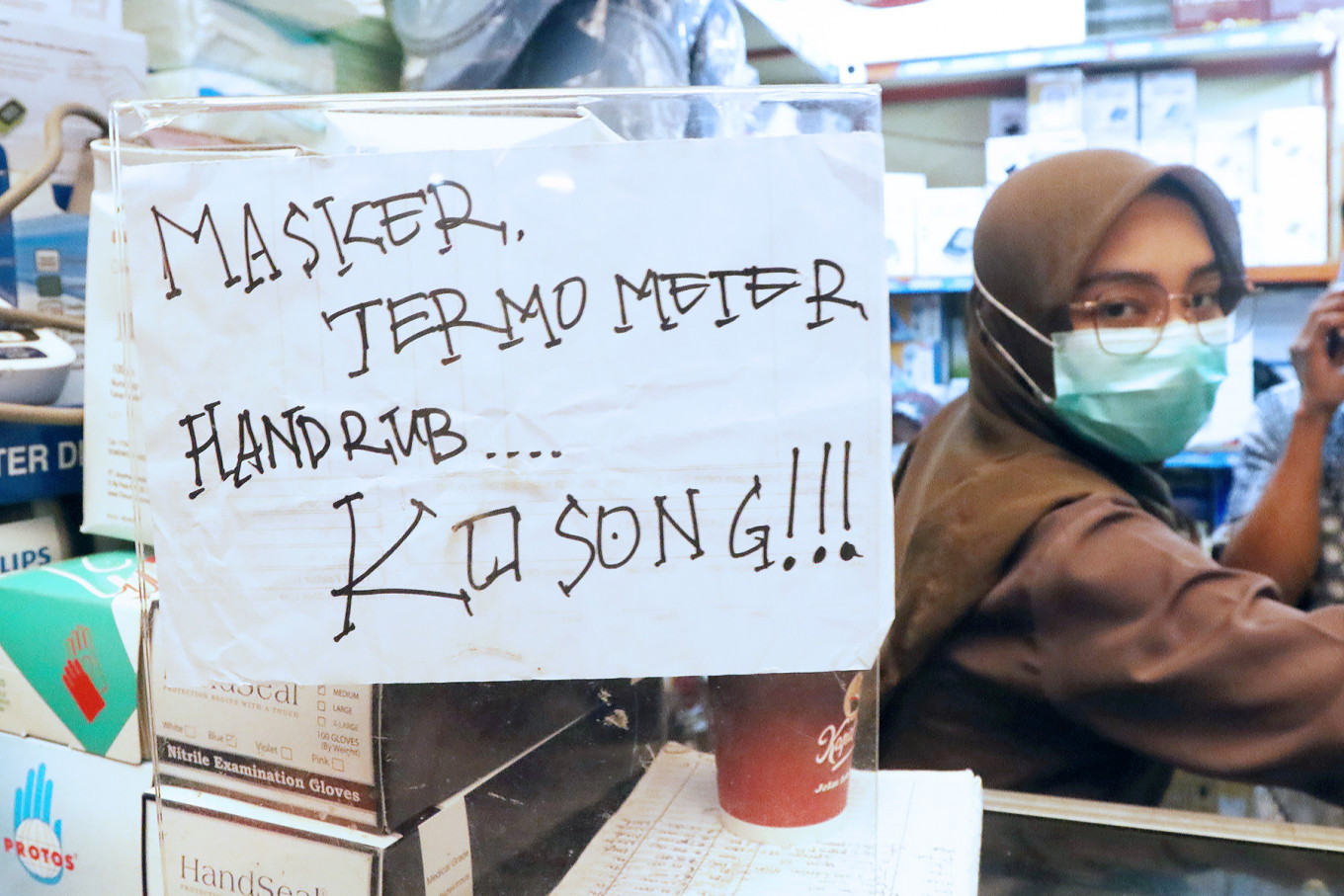Popular Reads
Top Results
Can't find what you're looking for?
View all search resultsPopular Reads
Top Results
Can't find what you're looking for?
View all search resultsMassive face mask, hand sanitizer shortage hit regions
The school started making its own brand of hand sanitizers following a major shortage in pharmacies and drugstores as people scrambled for protection against the COVID-19 coronavirus.
Change text size
Gift Premium Articles
to Anyone
A
s many as 500, 60-milliliter bottles of hand sanitizers with 96 percent alcohol content are now produced every day by students of Prajnaparamita State Vocational School in Malang, East Java.
The school started making its own brand of hand sanitizers following a major shortage in pharmacies and drugstores as people scrambled for protection against the COVID-19 coronavirus.
“We’re just trying to make up for the shortage. We regularly make hand sanitizers every semester,” the head of the school’s Clinical Pharmacy major, Deniar Wulandari, said on Thursday.
She said the school initially made 50 bottles starting on March 3, but demand soon began to rise in other areas, such as Jombang in East Java, Jakarta and Bali. Now, 32 students are involved in the making of the product, which they named Covid. One bottle of Covid hand sanitizer costs Rp 13,000 (US 91 cents).
Hand sanitizers commonly sold stores have a 70 percent alcohol content, but the school’s product contains 96 percent to better ward off coronaviruses such as COVID-19 and Severe Acute Respiratory Syndrome (SARS), Deniar said.
“We add aloe vera gel and glyceride to the formula so that the product won’t dry out your hands,” she said, adding that the school had filed for a production permit to ensure the products were safe and of good quality.
Residents have reported a shortage of masks and hand sanitizers following the government’s announcement of two confirmed COVID-19 in Indonesia earlier this month.
As of Monday, Indonesia has recorded 27 positive cases of the disease.
Meanwhile, in Blitar, several drugstores said they still received customers looking for masks, which have been sold out since early February.
"We’ve already put up a sign telling customers that we don't have any face masks, but they insist on asking for them," drugstore clerk Lina told The Jakarta Post last Tuesday.
She added that her store had been unable to stock up on face masks for more than a month, after customers started buying them in boxes for their migrant-worker relatives in countries that have been hit hard by COVID-19, such as Hong Kong, Taiwan and Singapore.
Many Indonesian migrant workers are originally from Blitar.
Yenry Sumarlin, the director of Sumber Waras drugstore, the largest drugstore in Blitar, said demand for face masks spiked when President Joko “Jokowi” Widodo announced Indonesia’s first positive COVID-19 cases on March 2.
He said Sumber Waras still had some N95 face masks in stock and they were being sold for Rp 50,000 per piece – more than triple their normal price of Rp 15,000 per piece.
Cheaper types of face masks, he added, had been out of stock since mid-January.
Yenry assured that his store would not allow customers to buy face masks in large numbers, saying each customer was prohibited from buying more than five pieces.
In Semarang, Central Java, the Central Java Police arrested three residents for alleged price gouging in the wake of the buying frenzy.
The three had reportedly been caught stockpiling face masks and hand sanitizers and reselling them at almost nine times the original price.
“We have confiscated 4,000 face masks as evidence, as well as hand sanitizers. One box of masks originally cost Rp 30,000 to Rp 40,000, but they were selling them for Rp 275,000,” Central Java Police spokesman Sr. Comr. Iskandar F. Sutisna said last week.
He said several areas in Central Java, including along Java’s northern coast (Pantura) highway and Brebes and Kendal regencies, had already run out of face masks and hand sanitizers because the hoarders had bought them all.
In Jambi province, all three pharmacies in Kuala Tungkal, West Tanjung Jabung regency, ran out of face masks a month ago.
“We don’t buy from distributors anymore. The price [of face masks] in Jakarta is already high; we don’t know how to sell them here,” Cece, the owner of Manjur Pharmacy in Kuala Tungkal, told the Post recently.
A face mask in Kuala Tungkal usually costs Rp 1000 or Rp 35,000 per box containing 35 pieces. One box now costs Rp 400,000.
“That’s not a decent price for this city,” Cece said.
Meanwhile, in many other cities in Jambi, a face mask costs Rp 4,000 to Rp 8,000 per piece.
Jambi Health Agency head Samsiran Halim said the agency was ready to distribute 700,000 surgical face masks and 7,800 N-95 masks. However, they will only be given out to people who are sick, he added. (aly)










